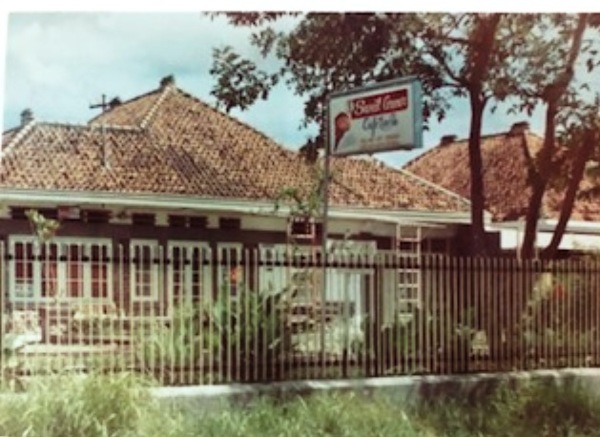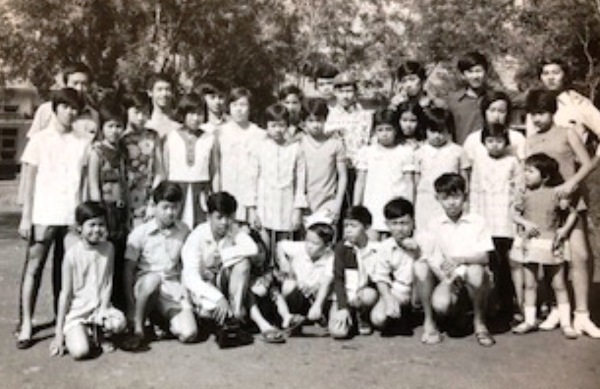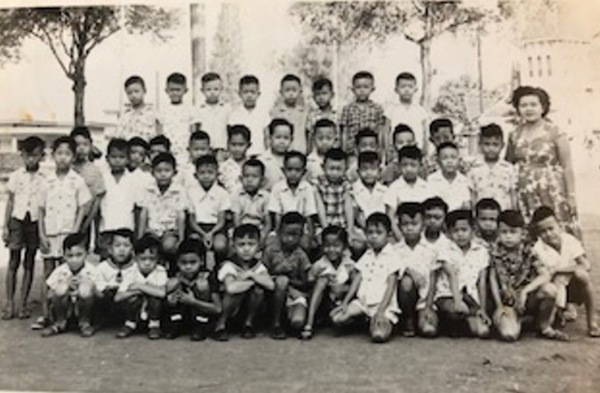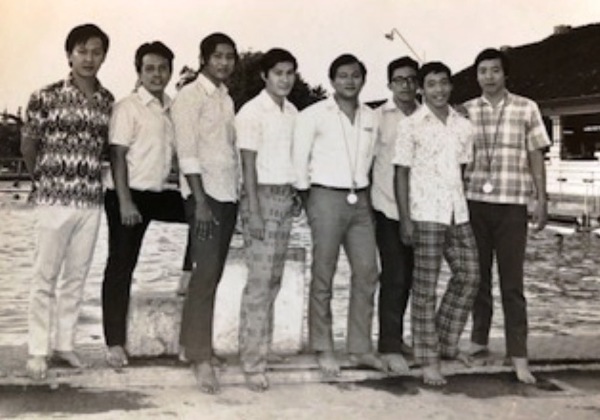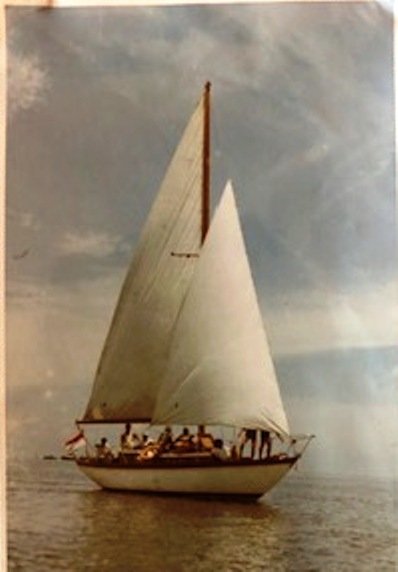

 字體:小 中 大
字體:小 中 大 |
|
|
|
| 2020/03/27 13:35:05瀏覽859|回應1|推薦1 | |
My name I am an ethnic Chinese born in Semarang, Indonesia. My name is Liem Bian Bie. I know how to write my last name 林 in Chinese, but do not know my given name in Chinese. No one in our family speaks Chinese, but my father has a friend who knows well enough to pick Chinese names for my cousins and me. Same as I, all my cousins have “Bian” as their middle name. My father’s siblings and cousins also have a common middle name, which is a tradition in my family. But the tradition may not be carried on to the next generation. When I was in junior high school (1965-1966), the strongman General Suharto encouraged ethnic Chinese to use Indonesian names. Everyone in our family adopted Indonesian last and first name. I started to use my official name Budi Muljono at school. But our friends, relatives, and classmates continue to use our original names. No one cares about, nor remembers the new Indonesian names of friends or relatives. At 22, I went to study in the United States, my name is Budi Muljono on my Indonesian passport. When I became an American citizen, I changed back to my original name. Finally I am Liem Bian Bie again. But my sister and brother in Indonesia still have two names, an official Indonesian name, and a Chinese name used daily. Their offspring have only Indonesian name. The family tradition of using Chinese name will not continue. My language My grandparents and parents received Dutch education, and Dutch is their mother tongue. Since I was born after Indonesia became independent, Dutch education was not available anymore, so I do not speak Dutch. I use Javanese dialect and Indonesian national language, the two are totally different. Javanese is only used among those less educated like workers, servants and the people at lower level. I only use Javanese with my friends and classmates. It is considered rude to use Javanese with elders. My parents use Dutch among themselves, use Indonesian to communicate with me. After independence, Indonesian language replaced Dutch as the official language, all newspapers and broadcast use Indonesian language, my parents improved their Indonesian language capability gradually after independence. My sister who was born in 1944, also received Dutch education, and her original language is Dutch. She is a dentist in Indonesia, Dutch is still her primary language till today. My grandparents and father I had little knowledge about my grandparents from my father’s side, since they passed away when I was born. I only know that my ancestors came from Fujian, China, but no one knows when or from which city. My father is the youngest of 13 children, he was a pharmacist, and ran a pharmacy with partners. The pharmacy seems to do well, provided a car and a chauffeur to drive him to and from work. My grandparents and my mother My mother came from a family highly influenced by Dutch. Her father worked for the Dutch, and was jailed in a concentration camp during the Japanese occupation (1942-1945). He died of diabetes in the camp, and was buried in a Dutch cemetery. Dutch people still send money to keep up the cemetery today. My grandmother from my mother’s side is a successful entrepreneur. She ran a grocery and a bakery. Though my grandmother is very westernized, she still kept some Chinese traditions in the family, such as the practice of ancestor worship at every Chinese New Year. My mother’s last name is Goei(魏), like everyone in her family, she received Dutch education, and had a Dutch name Lena. She ran a pharmacy and grocery store. Her business was good. Our family had our own car, a driver, and three live-in female servants. I had my own bicycle since elementary school. Most of our neighbors and friends lived the same middle-class lifestyle. Our house We have a single story house in an upscale community, which still there today(see photo below). Our community runs alongside a 3 miles long main street. The residents in our community are predominantly well educated professional, wealthier Hollandized Chinese. There were only a few native Indonesians and new Chinese immigrants. The friends of my parents and grandma are primarily wealthier Chinese with similar background. My father and a native Indonesian neighbor both liked cock-fighting. My father and the neighbor sometimes went to see cock-fighting together. Other than him, our family did not have any Indonesian friend. My friends are all Chinese with similar background. I lived in Indonesia for 22 years, know some Indonesians, but made no Indonesian friends.
Chinatown and traditional Chinese In addition to the upscale Chinese communities, there are traditional Chinese communities in Semarang too, Chinatown is the largest one. There are all kinds of shops and trades in Chinatown, such as grocery stores, drug stores, restaurants, etc.. China Town was an isolated, independent community. Residents there can find everything they need within, which makes them more isolated from the outside world. The Fujian dialect was the common language in the town. I had a friend in the same swim team, whose family is from Teochew, ran a building material store in Chinatown. From my friend, I know all building material stores in Chinatown are owned by Teochew people. Although we are both Chinese, but the Hollandized Chinese look down upon traditional Chinese, Chinese in Chinatown do not like us either, call us “Dutch Head”, we don’t socialize with each other. The following is a photo taken with the junior swimmers that I coached for two years. I am the one on the far right in the last row.
Elementary school and junior high Since my family had no religious faith, when I reached the age for elementary school, instead of going to public school where most students were native Muslims, my parents sent me to a reputable Catholic school ran by the Dutch. Our principal was a Dutch, all teachers were Chinese. We had more than 40 students in our class, where all were Chinese except two Indonesians. The following is a photo taken with our teacher Nio. I am the forth one from the left in the second row.
I continued my junior high at the same school. We had to take notes during class since there was no textbook at that time, from elementary school through high school. Anti-communist and anti-Chinese movement in the 1960s In September, 1965, several military officers launched a coup, which was cracked down by the forces led by General Suharto in a few days. Soon after the coup, the government started to crackdown on communists and their sympathizers. I was in Junior High at that time, saw soldiers arresting suspects at their home, and burned off their belongings. A friend of mine, 3-4 years older than me, run away to escape the purge, only re-appear more than 20 years later. Even though our family was not affected, we were worried and tried not to be involved. I remember I was strictly forbidden by my father to join any group or activity which we didn’t know it’s background. In 1966-1967, a series of anti-Chinese rules were announced, including: all Chinese schools were not allowed and closed, the disparaging term “Cina” became mandated to replace “China” for all official communications, Chinese language newspaper and magazines were not allowed, thousands of ethnic Chinese lost their Indonesian citizenship, etc.. This was when we were forced to adopt Indonesian names. HuiGuo - migrate to China During that turbulent time in the 1960s, thousands of ethnic Chinese migrated out of Indonesia for better life. Chinese government sent ships to transport those who are willing to relocate to China. Some of our friends boarded and moved to China. Normally a family picked a couple of their children to migrate to China, a friend of mine was one of them. I found out later on that, when he arrived, Chinese official confiscated all his belongs, told him he did not need it since everything was arranged. He went through the crazy years of the cultural revolution. Years after, his prosperous siblings in Indonesia helped him to move out of China. Even though he had a hard time living in China, he is still proud of China, which bewildered me. Even though our family never considered HuiGuo, but my parents did not rule out the possibility of sending us to China if the situation got worse. They hired a tutor to teach us Chinese at home. I had to study Chinese for a couple of years, and that was a big headache for me. I know a few phrases such as “LiHai”and a handful of Chinese characters, that’s all. High school After junior high, I entered a public co-ed high school, where same as before, most students, teachers, including the principal were ethnic Chinese. At that time, the government was actively purging the Communist party members and their sympathizers. Our principal was arrested and our school was closed and turned into a prison. Our principal was one of the prisoners locked up in the school. I transferred back to the Catholic school and completed my high school there. This photo was taken with my swim friend and coaches. I am the third one from the left.
Swim team When I entered junior high, I started to learn swimming at DaZhongShe. DaZhongShe was an organization similar to YMCA, offering sports, recreation, and social activities to teenagers and young adults, primarily ethnic Chinese. We practiced swimming for one and half hours every late afternoon, at the only swimming pool in Semarang city. I started to compete when I was 14 years old and won quite a few medals since, in free style, breaststroke, individual medley, and water polo. I started to compete locally, gradually moved up to the provincial level and finally at national level until I left Indonesia. In the best year, I won five medals. This photo was taken at the Junior National Swim Meet. I am the second one from the left. I learned a lot from swimming training and competition, one of it is self discipline. For example, my swimming team friends developed a good habit of being always on time, even now. I also learned that an athlete is more likely to lose than to win. We should not be bothered by losses, but to keep moving on. The following is the TCS water polo team group picture, I am the captain, the forth one from the right. University After taking entrance examination, I entered college to study Civil Engineering. Even though there were more native Indonesian than ethnic Chinese students in college, we Chinese students always hung out together. There was only one rich native Indonesian classmate joining us frequently. After 2-3 years in college, I moved to the United States and stayed there since then. This is a photo taken when we sail in Java Sea.
Epilogue I was born and raised in Indonesia and I love Indonesia. Unfortunately, Chinese Indonesians do not have the same rights and equal opportunities as the natives in various areas, such as education or career path. I cannot even keep my own name and I feel Indonesia does not like me. I visited Indonesia every couple of years since I settled down in U.S.A.. I like to live in Indonesia if Chinese Indonesians is accepted as natives. I sincerely hope that day will come. |
|
| ( 不分類|不分類 ) |


